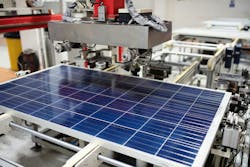White House Announced U.S.-India Initiative for Clean Energy Supply Chain
On September 21, the White House announced that the US will work closely with India to "elevate and expand bilateral technical, financial, and policy support to expand complementary U.S. and Indian manufacturing capacity for clean energy technologies and components."
To launch this partnership, the two countries are working to unlock $1 billion in new multilateral finance through the International Bank for Reconstruction and Development for projects that include catalyzing India’s domestic clean energy supply chain buildout.
The funding could support supply-side manufacturing capacity expansion for key technology verticals, focusing on solar, wind, battery, energy grid systems, and high-efficiency air conditioner and ceiling fan supply chains.
The agreement calls for the two governments to work with industry leaders on the following lines of effort to launch and eventually scale this new partnership:
Identifying near-term investment opportunities to expand manufacturing capacity for specific clean energy supply chain segments, with initial focuses on the following clean energy components:
- Solar wafers and wafer manufacturing equipment & next generation solar cells
- Wind turbine nacelle components
- Power transmission line components including conductors, cabling, transformers, and next generation technologies
- Energy storage components including batteries
- Battery packs for 2- and 3-wheel electric vehicles (EVs) and zero-emission e-bus and truck components
- High-efficiency air conditioners and ceiling fan components
Collaborating with the private sector to scope eligible opportunities in the above supply chain segments and support an initial package of pilot projects, ideally including one project focused on clean energy deployment to Africa.
Additional investments plans and sources of funding can be developed over time. This effort would build on private sector partnerships facilitated by U.S. Development Finance Corporation (DFC) across the solar, wind, battery, and critical minerals sectors to pursue opportunities to finance the manufacture of clean energy components.
Such investments may be in scope for India’s Green Transition Fund – which will support renewable energy, storage, and e-mobility investments in India and strengthen demand for localized manufacturing – as well as for Indian private equity fund manager Eversource Capital’s new DFC-supported $900 million fund to invest in clean technologies such as renewable energy, efficient cooling, and electric transportation.
Building trilateral relationships with African partners that have stated political commitments to clean energy deployment, focusing on solar and battery storage opportunities.
India and the United States can work multilaterally with African partners to pursue high-potential solar and EV deployment opportunities, understand the conditions required for project success, detail the partnerships and financial model for project success, and implement the project.
The United States intends to collaborate with Indian companies to explore investment opportunities and facilitate public-private matchmaking expand partnerships with local African manufacturers. DFC and the U.S. Agency for International Development are anchoring this effort by collaborating with India-based International Solar Alliance to deploy solar and EV charging networks near health facilities.
Collaborating with each other and industry to consult on policies that will strengthen demand certainty for locally manufactured clean technologies.
The U.S. Bipartisan Infrastructure Law and Inflation Reduction Act were historic laws designed to invest in the large-scale deployment of clean energy technologies while also reinvigorating the manufacturing capacity of the United States to appropriately onshore clean energy supply chains. Likewise, India’s Production Linked Incentive Schemes have invested over $4.5 billion to catalyze nascent clean energy manufacturing.
However, additional policies are vital to expand and protect these investments in the face of global market dynamics and thin profit margins. Both countries acknowledge the importance of sharing insights on how to design policy frameworks to reduce demand uncertainties and ensure sufficient input materials, technological expertise, finance, and other manufacturing enablers are available and secure.
